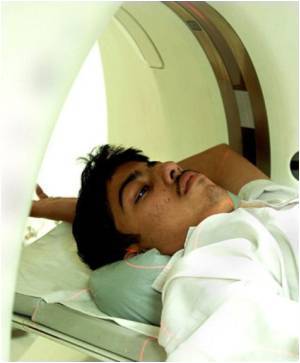Magnetic resonance imaging (MRI) used to evaluate responses to pre-surgery (neo-adjuvant) chemotherapy or radiation may predict survival among patients with advanced rectal cancer

MRI prior to surgery could help in the management of patients in a number of ways, including offering more intense therapy or alternative chemotherapy to those patients who appear initially resistant to chemotherapy, or changing the surgical plan.
"This is the first time that MRI has been shown to predict outcome for patients with rectal cancer who have completed initial chemoradiation therapy," said lead author Gina Brown, MBBS, MD, consultant radiologist and honorary senior lecturer in the Department of Radiology at the Royal Marsden Hospital NHS Trust in Sutton, UK. "MRI staging and reassessment of rectal cancers before and after chemoradiotherapy are not routinely done for all patients. We've shown that using MRI this way can help change the course of patient care, perhaps enabling physicians to choose a more effective chemotherapy drug or even in some cases ultimately avoid surgery."
In the study - called MERCURY - researchers used MRI to measure tumor shrinkage in 111 patients who had previously undergone preoperative radiotherapy or both chemotherapy and radiation (chemoradiation) for locally advanced rectal cancer. The group - part of a larger study of MRI use in improving rectal cancer staging begun in 2002 - was followed for five years. The researchers measured tumor response in terms of "tumor regression grade (TRG)," which measures the degree of tumor shrinkage after therapy, and the involvement of "circumferential resection margin (CRM)," which refers to the remaining cancer at the tumor edges after treatment, or predicted to remain after surgery. Patients were broadly designated either a "good" or "poor" responder to chemoradiation, according to MRI, and researchers compared survival of the two groups.
Investigators found that 72 percent of good responders to chemotherapy/radiation were alive after five years compared to 27 percent of those who were poor responders. The disease-free survival for those with good responses was 64 percent versus 31 percent for the poor responders. In addition, local recurrence rates at five years for those patients for whom there was MRI-predicted CRM involvement was 28 percent compared to 12 percent for patients with predicted cancer-free tumor margins.
Rectal cancer is commonly found in advanced stages, and as a result, neoadjuvant chemoradiation is frequently given to try to shrink tumors and make them easier to remove. While surgeons attempt to completely remove the cancer in order to minimize the chances of cancer returning, advanced tumors are more difficult to completely remove and more likely to have unseen cancer remaining at the edges of tissue at the surgery site. A positive surgical margin (tumor that remains at the borders of the surgical resection) is considered a strong predictor of local recurrence.
Advertisement
"The next step is to take these tumor response grades and decide what the best treatment approach could be based on the degree of responses," Brown said.
Advertisement
ASCO Perspective: Morton Kahlenberg, MD, ASCO Cancer Communications Committee member and surgical oncology specialist
"This work has significant scientific and clinical importance because it shows that performing MRI following initial chemoradiation therapy and before surgery may predict long-term outcome and identify patients who could benefit from more aggressive therapy prior to surgery. This could change the standard of care for these patients, since using MRI may suggest the need for further treatment before surgery. Clinical trials are needed to address this important question."
Source-Eurekalert














